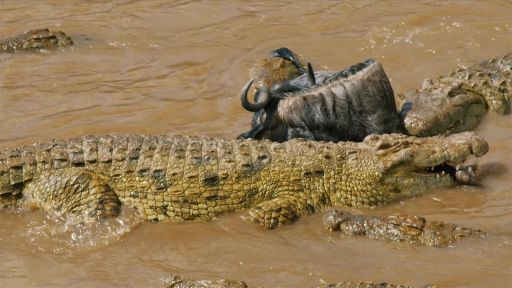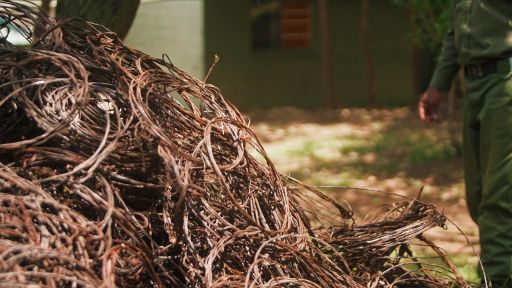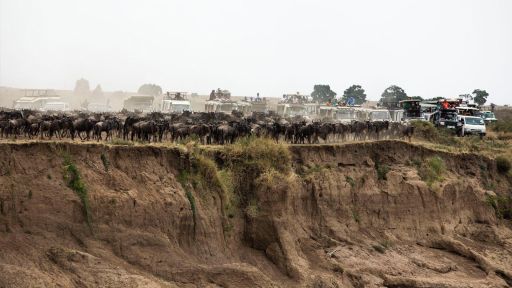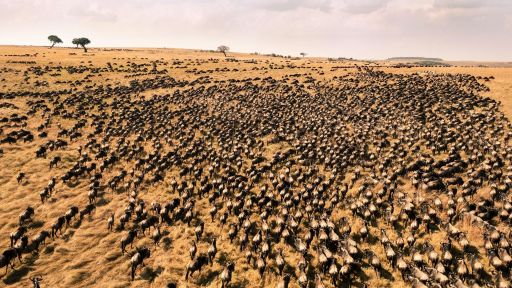Clement Kiragu, a Kenyan trainee cinematographer on Running with the Beest, recounts the thrills and challenges of working on his first wildlife film. From setting up crucial time-lapses to operating the croc cam, his 64 days in the wilderness are packed with action. Clement also makes the case for Kenyans stepping up to tell the story of their natural world and the wildlife around them.
Features




(wildebeest bellowing) - My name is Clement Kiragu.
I'm a wildlife photographer.
I lead photo safaris and I photograph wildlife.
Basically, I document wildlife and that's what I love doing.
Before this experience, I had not touched a cinema camera, but my experience in wildlife, I feel like that helped me a lot.
Even if I didn't have so much experience in film, I know my animals, I know them so well, and I love them and I love spending time out there.
(Jeep rumbling) There should be more people telling these stories.
And I would love those people to be people who live right next to Maasai Mara, who are experiencing these problems.
I would love them to be the one telling these stories.
That's what I would love.
(speaking foreign language) (animals bellowing) My biggest brief of the project was to go out there and get time lapses and, and because they're very important for the film.
They transition you and they move you from one place to another.
Time lapses is a game of patience and not knowing what will happen.
So you plan all these things, but weather plays a big part.
Atmosphere plays a big part.
(rain pouring softly) You'll set up this time lapse, it's almost two hours long and you'll only see the results of a few minutes by, of a few seconds, by the way, at the end of it.
There's one time lapse I remember very well.
I knew sometimes there's fog that comes in the Mara, because I've worked in the Mara so, so many years.
Like from 2013 I've been going to the Mara, every year for migration.
And in the 64 days that happened, it only happened once and I got it, because I was ready.
There was a lot of clouds rolling into the mist.
It was in that golden light, it was just perfect.
When time lapses align, it's magical.
It's magical.
Crocodiles, I spent two weeks with crocodiles, because my producers told me, 'Get into their heads.'
(Clement laughing) So I got into their heads.
Crocs are very interesting creatures.
They move like maybe two, three times a day.
So you, you really need to be attentive.
Because the whole day you're sitting there thinking, 'These guys are asleep.'
But when a grazer comes and just starts drinking, you see how smoothly they just slide into the water and become invisible and they start to act.
That's when you see some crazy things.
(crocodiles splashing and growling) It's not an easy thing to witness, but it's nature.
Sometimes, we will get to the camp so tired, but it was so worth it.
Seeing nature roll as it comes, you know, for 64 days it, it does something to your life.
(singing in foreign language) I would want more Kenyans to document wildlife and to love wildlife as I do.
Even this opportunity didn't come easy.
I had to work hard.
I have to look for the right partners to give me the chances to work in such a film.
It doesn't even come easy.
I don't think it's ever been done before, where a photographer came from still photography and went direct into working into a wildlife film.
But how do I get to document the animals that I love so much?
Because I feel there are stories like this one, which haven't been told properly.
And I think it's my duty as a storyteller, to tell those stories.
(singing in foreign language) It's our heritage.
We need to own it.
This is one of the biggest ecosystems in the world and not many people care about it.
(wildebeest bellowing) You can't sit around and wait for people to tell your stories.
You have to do it yourself.
(Jeep engine rumbling) (crickets chirping)
